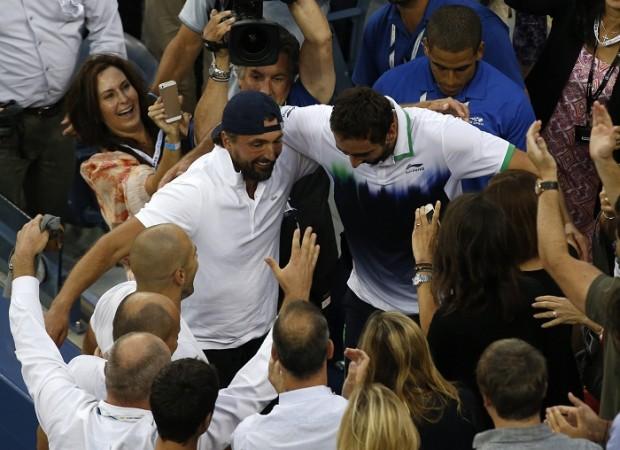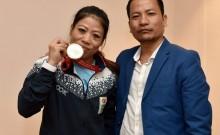
Coaches in tennis are sometimes overlooked -- seen as merely a presence in the player's box as he/she turns around time and again to either berate and complain or shout out that "c'mon" after winning a point.
However, of late some high-profile coaches have been roped in by the tennis superstars, with Roger Federer working with Stefan Edberg, and coming in a lot more, Novak Djokovic hiring the great Boris Becker and Andy Murray setting up a terrific partnership with Ivan Lendl, a partnership which won him two Grand Slam titles.
Murray has gone off the boil a little bit following Lendl's departure -- even if that might have to do with a back injury with positive signs definitely being shown under new coach Amelie Mauresmo -- pointing to the fact that these high-profile coaches actually play a big role in helping the tennis superstars to titles.
On Monday night, in the US Open 2014 final, there were two big-name coaches cheering on two of the more unheralded players on the court. On Kei Nishikori's side was Michael Chang, the American fighter who never knew when he was beaten, and on the new US Open champ Marin Cilic's court was one of the most liked players of all-time – Goran Ivanisevic, the man who tried, tried and tried again before eventually winning his beloved Wimbledon title in 2001 in that unforgettable final against Australian Pat Rafter.
Ivanisevic has certainly had a major impact on his fellow Croat Cilic, lifting the 25-year-old's serve, which was already good, to another level, while also instilling that confidence and "smooth operator" strut so essential when playing Grand Slams.
"We all know how Goran is emotional on the court, but that's only when he's playing," said Cilic. "That's his desire to win, and difficult to control the emotions. But sort of when he's on the practice court, when he's with me, he's always really, really calm or nervous when he's watching.
"He brought just, in the team, very relaxed atmosphere, besides extremely huge knowledge. The help he brought to me, I feel that the fun is the best spice of everything, that I think collects all the other pieces together. I mean, every day with him is extremely fun."
Cilic had plenty of time to work on his game with Ivanisevic after the Croatian was given a four-month ban for testing positive for a banned substance. Cilic has, of course, maintained his innocence, saying he took the stimulant unknowingly via a glucose tablet he bought at a pharmacy in May of last year.
The Croat was initially given a nine-month ban, before it was reduced to four months.
Time off the court, though, has certainly helped the player remarkably, with Ivanisevic playing a big part in the player's progress. "We started to work September 1st (2013)," revealed Cilic. "Since then until like sort of end of the year we were working very, very hard.
"Goran, in his day was, I feel, and by most of the guys were saying, he was athletically and physically best player in shape. And he was absolutely ready for everything. We worked a lot on that. I felt that helped me to gain some, you know, extra steps in my game. With everything, that helped me to become better."
The difference between the top, top players and the top players is so small that, more often than not, it comes down to how you play the big points, how many chances you take and if those chances pay off. Ivanisevic, yet again, was a big factor in Cilic taking that tennis to the next level, like he showed so outstandingly in the semifinal, blowing a player of Roger Federer's calibre away, before doing the same to Nishikori in the final.
"At the beginning when we started to work, we sat together and Goran told me that my game and my tennis has to be aggressive tennis," said Cilic. "I can't play too much tactically, because most of the times before I was dealing too much with the tactics against players and not focusing on my game. It was always in a bad ratio. It was more thinking about tactics, like 70 percent, and thinking about my game, to do those things well in a smaller percentage.
"Then we started to work together. It wasn't easy to change my perspective and to change completely my mindset. It took definitely, you know, even five, six months of the tournaments to be able to sink that into me and that I know on the court that's the right way for me to play.
"That was the most difficult part. But from all the other parts, definitely serve has improved enormously, and then everything else has followed. Because I was much more pushing myself to play the way of the game I need to play. Week after week, I mean, you have to get better in what you do."








